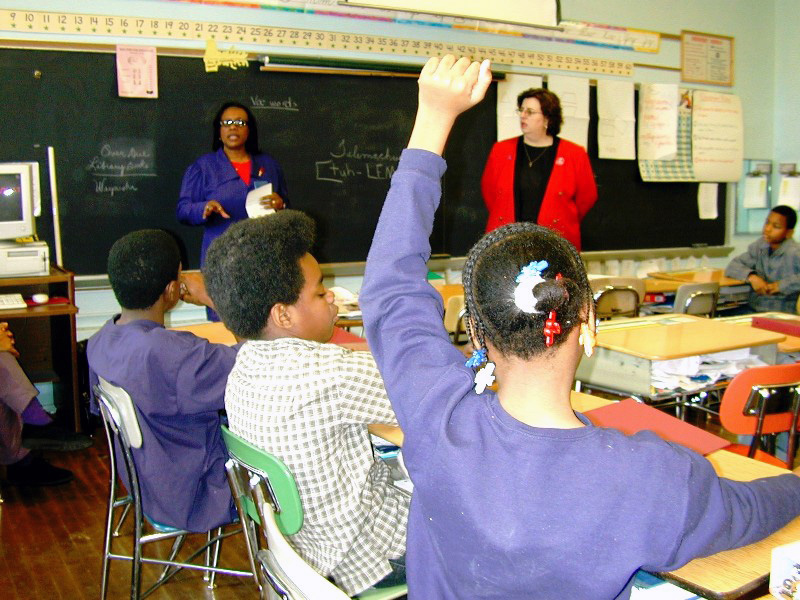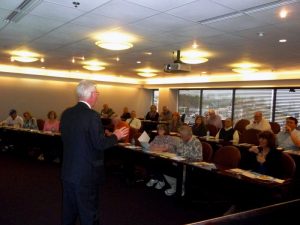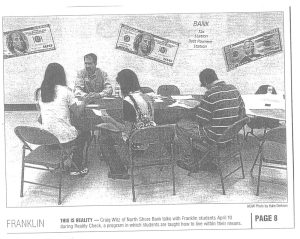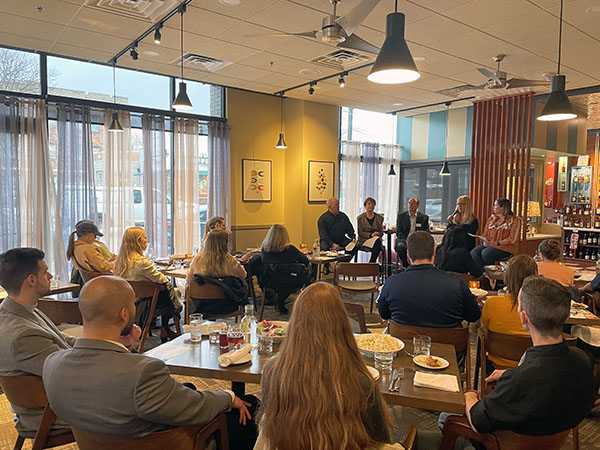
Milwaukee Capitol’s Ruthie McDowell (who retired in 2014) and Carol Herrman (who retired in 2013) speak to a classroom of students about financial literacy.
Though we haven’t always identified as “The Bank of You,” North Shore Bank has been committed to delivering personalized service to our customers and communities throughout our history. One reflection of this is our long-standing mission to promote financial literacy — not just offering products and services, but also giving people the knowledge and resources to improve their financial well-being.

Investment consultant Dennis White shares his expertise on Social Security at a seminar in 2015.
Financial literacy encompasses a number of topics, including maintaining a budget, growing your savings, managing debt effectively, and intelligently evaluating your options when choosing products and services like credit cards, mortgages, and investment vehicles. Financially literate individuals are less likely to be blindsided by financial emergencies and much harder for scammers to prey on.
North Shore Bank has been focused on providing financial knowledge to empower people — of all ages — for a long time. As this article from the July 1998 issue of Shorelines notes, even back then we had been a strong longtime supporter of Junior Achievement, a national organization dedicated to teaching kids about financial literacy and preparing them for successful careers. Chairman Jim McKenna shared his feelings about JA’s importance in an article in the Fall 2001 issue of the newsletter.
“The future of our society and country depends on young people becoming more educated about the economy and our free-enterprise system,” Mr. McKenna told Shorelines. “What better way to teach economic literacy than through the classroom?”
He also notes that many North Shore Bank leaders and employees volunteered their time to actually go into high school classrooms for a semester of economics.
Last year, Milwaukee’s BizTimes recognized commercial banking manager SVP Margaret Capper for her work with the Latino Chamber of Commerce of Southeastern Wisconsin.
“We are a community bank that has been around for 100 years, and our responsibility is to serve people within the community,” Margaret says. “Promoting financial literacy in our communities is a simple, very effective way to empower them and to lay the foundation for long, successful relationships.”

Craig Witz talked to Franklin students in 2008 as part of the Reality Check financial education program.
As we’ve detailed recently, area manager Alfredo Martin has devoted much of his 20-plus years in banking to improving financial literacy in Milwaukee’s Latino communities, with free bilingual “Your Path to Wealth” seminars being held regularly at the Jackson Park branch. Last year, he was honored with a Governor’s Financial Literacy Award from Tony Evers.
In the last few years, our “You Can” happy hours have paired financial education with local hospitality, giving members of the public a chance to engage directly with our bankers and other experts while enjoying tasty food and drink.
“It gives us an opportunity to meet not only with our amazing customers, but also with those in the community who have not yet walked through our doors,” says Shorewood branch manager Shannon Weber, who notes that as a financial institution founded by teachers, sharing this kind of information is at the heart of who we are. “When we share ways we can help, it just reinforces the value we have to offer.”
“Promoting financial literacy is fundamental to what a bank should do,” says senior mortgage lender Greg Kroll, who has been on our panels at the happy hours and contributed to the a series of articles North Shore Bank produced for the Shepherd Express that inspired the in-person events. “We exist only because of our customers — I believe it is our duty to help educate them when the opportunity arises. And I believe they will remember and thank us for that help, and this will reflect back to us in the form of happy customers who stay with the bank.”
“It’s essential for our business to grow,” agrees Muskego personal banker Matthew Cieslak, who has spoken to local high school students about careers in banking and financial literacy with branch manager Stephanie Ruiz. He notes that financial literacy gives customers the language to understand and communicate their needs. “That allows us as bankers to get to the root of their goals and to build plans to achieve them.”

Greg Kroll, investment consultant Jeff Eichel, and other panel members address attendees at the “You Can” happy hour at Buttermint in March 2022.
Along with events and newspapers, we’ve also shared financial literacy advice over the radio, on La GranD 104.7 FM. One of the biggest moves we’ve made is our partnership with Banzai, which allows us to share dozens of free articles, coaching courses, and tools to improve financial literacy online at northshorebank.banzai.org/wellness.
Initially, our work with Banzai focused on providing the organization’s curriculum for kids to schools in our communities. (One teacher described the program as “vital” to students’ success.) Not that a specific curriculum is always necessary — teaching financial literacy can be as simple as playing The Game of Life with middle schoolers or giving a tour of the branch to a Girl Scout troop.
“We do this because it’s the right thing to do — and it has the benefit of enabling customers to make use of more of our products,” says VP branch sales Craig Witz of all of the ways our employees encourage financial literacy. “When we can help a customer achieve a financial dream such as buying a house, we can all celebrate with them. And when that customer uses a North Shore Bank mortgage, everybody wins. That’s ‘the Bank of You’ in action.”
